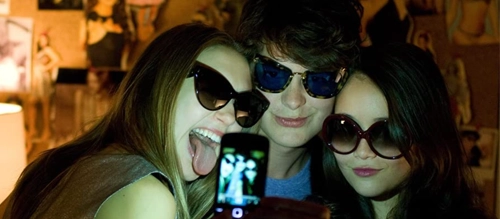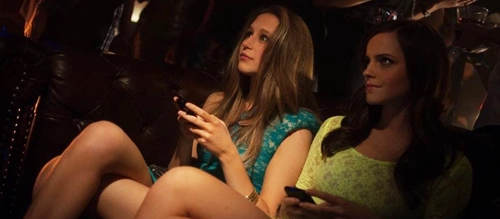‘The Bling Ring’ at 10 – Review

The Bling Ring (2013)
Director: Sofia Coppola
Screenwriters: Sofia Coppola, Nancy Jo Sales
Starring: Katie Chang, Israel Broussard, Emma Watson, Claire Julien, Taissa Farmiga, Georgia Rock, Leslie Mann
Ten years on from its initial release, the social media landscape depicted in Sofia Coppola’s satirical thriller The Bling Ring (2013) has changed significantly. The film’s sentiments towards celebrity culture and our collective need for external validation have, however, held up, making The Bling Ring a timely pre-cursor to the world we live in now, and a continually relevant film.
Set in Calabasas, California, The Bling Ring follows five teenagers as they burglarise multiple celebrity homes, including those of at-the-time A-Listers Paris Hilton and Lindsay Lohan. It was based on the true story of the ‘Bling Ring’ robberies that inspired the article “The Suspects Wore Louboutins.” The article is referenced directly by Coppola’s film, with Israel Broussard’s Marc and Emma Watson’s Nikki being interviewed throughout in accordance to journalist Nancy Jo Sales’ original work.
From the opening line, “let’s go shopping”, we are immersed into the teens’ fame-obsessed ambitions as they treat the wardrobes of celebrity homes like all-you-can-eat buffets, flagrantly disrespecting the possessions of celebrities in the callous way that only teenage rebelliousness can inspire. It is interesting to note that these teens are incredibly affluent themselves, so their motivation for these robberies comes in the form of the prestige of the celebrity name, rather than the product itself. They could probably afford luxuries from the top designer brands, but it doesn’t matter unless a celebrity has endorsed it. The most illuminating example of this is when the teens rob Lindsay Lohan’s house – Coppola uses a slowed down long take of Rebecca (Katie Chang) trying on her idol’s perfume. It’s not the perfume itself, it’s the fact that it’s Lindsay Lohan’s that makes it so special to her.
And this is still true nowadays, but on an even larger scale. We now look to ‘influencers’ on social media, who peddle all sorts of products ranging from tummy teas to hair extensions. A Zara jacket is just a Zara jacket until Molly Mae wears it.
Although it is one thing to be wearing a celebrity’s clothes, it really doesn’t matter unless it has been photographed and shared for the world to see. The film is populated with shots of the teens taking photos of each other with flash flip phone cameras. A notable example of this is Marc taking a photo of Rebecca as she lies on Paris Hilton’s bed, documenting her trespassing like it’s a trip to Madame Tussauds. The excessive showing off of their crimes is what ultimately leads to their downfall, as the police are able to identify the perpetrators and the stolen goods through the photographs they share to social media.
Whilst Facebook albums might be out in 2023, Instagram dumps are in, and everyone is in competition with each other to prove who is partying the most or having the most ‘aesthetically-pleasing’ month. This competition for likes and for followers makes us needy for external validation. Whilst this isn’t a prison sentence, it does lead us to having a poor sense of self and has been acknowledged as a contributing factor or cause to many a person’s mental health struggles.
This concept is primarily explored by Sofia Coppola through the character Marc (Broussard), who discusses his struggles with his self-image in his interview early on in the film. A turning point comes in a rather amusing scene in which Marc records himself on his laptop, smoking a joint and lip-syncing to “Drop it Low” – a moment notably not too far from the lip-syncing popularised on TikTok over recent years. This is the first time we see Marc genuinely happy on his own, viewing himself with admiration through the laptop’s low-quality gaze. It is a very early example in cinema of how social media can inflate our sense of self and gift us external validation. It was only the celebrities that got photographed and had coveted lifestyles prior to the era The Bling Ring depicts, now it can be anyone.

It would be unjust to write about this film without mentioning the unbelievably brilliant soundtrack. Opening with the screeching guitars of Sleigh Bells’ “Crown on the Ground” and closing with Frank Ocean’s masterful “Super Rich Kids”, the film is jam-packed with songs from the 2013 party scene, with the most notable being “212” by Azealia Banks, which features Emma Watson dancing like a maniac.
The increasing intensities of the musical choices mirrors the spiralling decline into notoriety the ring endure. At the peak of their crimes, there is a slow-motion wide shot of the teens strutting down a street lined with clothing stores top-to-toe in their stolen goods, as Kanye West’s “POWER” blasts. We are encouraged to mock their attempts at being ‘iconic’. The transparency of this scene encapsulates The Bling Ring’s core thematic exploration of the lengths people will go to in order to feel special, like a celebrity, even if it is all fake.
Whilst the film certainly doesn’t condone the robberies, it does take a critical stance regarding how excessive celebrity lifestyles are. As Nikki points out, ‘why does she need two [dresses]?’ This is a part of the very current issue surrounding the redistribution of wealth, and ensures an unfortunate timely relevance to this decade-old feature. Ultimately, we still feel no sympathy or alignment towards the Bling Ring, as their motivations are purely self-serving regarding their thirst for fame – it gets to the point where Marc has to ask Rebecca if she’d ever rob him; she says no, but somehow we don’t quite believe her.
Disappointingly, the themes and commentary surrounding The Bling Ring are more interesting than the film itself, with much of Coppola’s offering becoming repetitive – the club scenes are particularly egregious (clothes, photos, dancing, coke – we get it).
The Bling Ring is, overall, a tight 86-minute film with a killer soundtrack, thrilling pacing and darkly funny one liners delivered by a great leading cast. Ten years removed from its release, this contemporarily relevant film is still worth a watch, even if it is just to read the commentary surrounding it. The Bling Ring is a time capsule and yet still unbelievably relevant.
Score: 18/24
Recommended for you: Sofia Coppola Movies Ranked
Written by Grace Laidler
Follow Grace Laidler on Twitter: @gracewillhuntin

